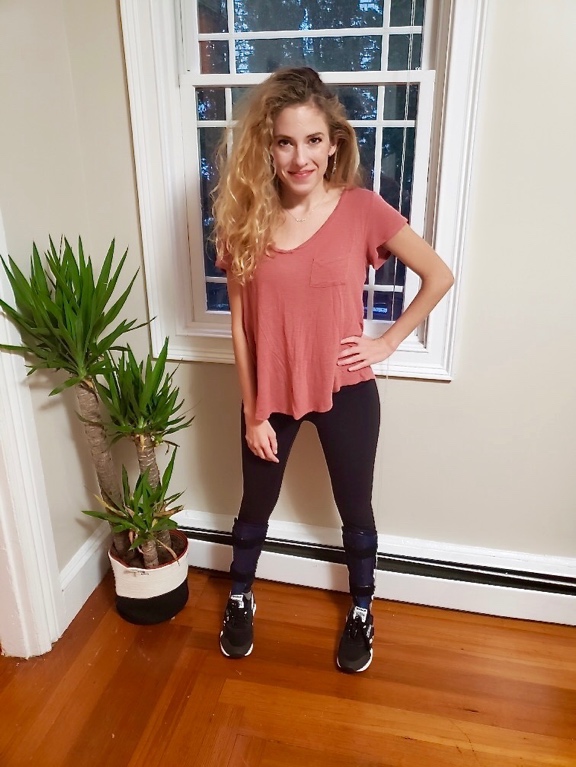I am a teacher, and I had decided to get tested because another teacher at my school tested positive. To be honest, I was completely stunned when I received the news. [Side note: thankfully my school had gone remote because of the other teacher’s results, so I didn’t expose any students or co-workers.] I didn’t recognize any of the symptoms I had been feeling as out of the ordinary.
In hindsight, I was able to identify the symptoms I had missed. I was incredibly exhausted the week prior to receiving the results of my test. My muscles were run-down, my mind was drained, and I craved the coziness of my bed before it was even time for dinner.
As I was discussing my situation with a friend, she asked if it was possible that I didn’t recognize or honor the symptoms I was experiencing because I was so used to ignoring or minimizing my body’s “messages.” *ding ding ding: we have a winner!* The truth of her words creeped in like a familiar and annoying pest that is impossible to rid from the cupboards.
Especially given the potentially serious complications of CMT and Covid-19, I am incredibly grateful that my symptoms were not serious. But the situation did remind me of the urgent need to consistently check in with my body.

Because of my experience with CMT, my relationship with my body has been focused primarily on minimizing my discomfort and ignoring my pain. I don’t want to acknowledge the soreness in my tendons, because I don’t want to deal with wearing a walking boot again. I don’t want to come inside from the snow, even though the neuropathy is causing my feet to feel so painfully cold. I want to stay one more hour at that party, even though my feet are hurting and swollen. I want to be able to walk across the amusement park to the roller coaster, even though the distance will make my legs buckle in exhaustion. I want to be able to trek down the field to see my students play soccer, even though I may risk twisting an ankle on the uneven terrain. Minimizing my body’s cries for care has been a (if not, THE) hallmark way that I approach my body.
A few years ago, I went to see a new physiatrist to discuss the progression of my CMT. She reminded me of all of the classic and time-consuming rituals that should be integrated in my daily life: foot checks, stretching twice a day, balancing practice, strength conditioning, and getting more than 8 hours of sleep to make up for the extra energy my body has to expend to get around. Because I have been hearing these reminders since I was in middle school, I usually just swat them away as if they were gnats swarming on a summer day. Also, who has time for all of that?!
But then this doctor said something else that no one had ever said to me before: “You should also do things to appreciate your body.”
What? Wasn’t I trying to check off the endless list of physical tasks because my body was doing it wrong? Wasn’t I doing these things because my body was broken, and I needed to spend hours each day trying to pick up the pieces?
As I reflected on her comment, I realized I had framed bodily self-care as a way to fix or counteract a failing or broken body. But what if it is something different? What if it was really about learning to love again?

In that psychiatrist’s comment, I realized that attending to my body is not about fixing. It is about re-learning to love something that has gone through a lot of struggle. It is not about zeroing in on the failures of my body. It is about reconnecting with the muscles, sinews, and bones that have been working so hard to allow me to continue living my life. Her comment also reminded me that self-care is not only about paying attention to and caring for my body when it is uncomfortable or in pain, but also about attending to and thanking my feet, legs, arms, and hands for their valiant efforts every day. This appreciation can be expressed in many different ways: soaking my feet, taking a long nap, scheduling a massage, or taking time to lay in the grass under the sun, even though I have other “more important” tasks to do.
Let me be clear: I still have A LOT of work to do when it comes to listening to and honoring my body’s calls. My very recent experience with Covid-19 is a testament to that. However, I think there is some very important wisdom to be shared for how people with disabilities view self-care.
Self-care is not about doing damage-control on a broken or failing body. It is about expressing appreciation for your body in a world that certainly won’t do that for you. It is about claiming the care and love that your body deserves.
Can you relate? I would love to hear from you in the comment box below. Also, I’d love to connect with Trend-Able Tribe members via my Instagram @the_homecoming_.



I’ve had CMT for 15 years now. Been wearing my AFO braces for 6 years. I was moved by your story, to know that I’m not the only one out there. Everyday When I get up for work, my attitude is high. But when I get home and my legs hurt and swollen. I just want to crawl back in bed. But I know I can’t let this get to me and win. I must fight and be in control.
Hi Paula,
You are not alone! I’m glad you found us. I get it completely…xo
Thank you so much for sharing this! I’m 57 and have had CMT since college. Such a great reminder to not just focus on what my body CANT do, but what it can, and to not feel guilty about needing extra rest. Sometimes I’m amazed at how much energy I expend doing the simplest tasks!! ??
Thank you Amy for reading & taking the time to comment! Happy Holidays to you & yours. Xo Lainie
Wow, this post has me in tears, so powerful. Everything you have said has hit home for me. I wear braces on both my legs due to a spinal cord illness. In 2011 before I lost the use of my legs, I was a runner, a mom, wife, worker and my life crashed in a blink. I spent months in hospital, in a wheelchair, using a walker and now braces. I always had the mindset that everyone needs me so self-care was not on my list of things to do. I spend a lot of time in the bathroom crying, asking why me? I can’t run, I can’t wear high heels, I can’t dance, I can’t do things with my children. I stay home all the time because it’s just easier. I don’t feel sexy as I once did, I feel bad for my husband because I feel I’m letting him down. I just want to stay on the couch. OMG I have never thought about all that I can do. I have never thought about all the hard work I have done to get out of the wheelchair. Omg my mind and body not only needs but we deserve self care. By the way, I’m still crying but I think they are happy tears now. I can’t thank you enough for this post. Nobody knows how much they can impact someone else’s life just by being kind and sharing their experiences. Thank you for this post, Thank you Lainie for everything you do. I wouldn’t be reading this without you.
Thank you so much for sharing your story, Michelle. I cannot even begin to imagine how difficult that sudden change and adjustment must have been. You should be incredibly proud of the work you and your body have done to get to where you are today. The fact that you have gone from wheelchair to walker to braces is absolutely amazing! There is so much strength and tenacity that that type of journey requires. Your body deserves so much love and appreciation, even though I understand how challenging this feels some days. I am so grateful that you resonated with my post 🙂 Thank you for your beautiful comment and for sharing your story!
Talease – first of all, you have an awesome name. Secondly, thank you!! You’re so right that this is a journey. I am constantly reminding myself of the love and appreciation my body deserves 🙂 I’m totally going to use your “mantra” in my everyday life!
Norma – I nearly cried just reading that you cried! It means so much to me that you were able to connect with my experience. I am so sorry about your experience in school and in gym class — that is such a painful thing to have to experience. Your perspective on your life now is incredible! And so inspiring! I have learned that I shouldn’t ever watch videos of me walking, because it just makes me feel downhearted. I have had similar negative and sad reactions to the one you describe :/ You should be incredibly proud of your ability to rise up after that! And of what a wonderful son you have raised! Thank you so much for sharing this experience with me, and for your kind words and blessing 🙂
Raegan, thank you so much for reading my post! And thanks for your well wishes – thankfully I am fully recovered 🙂 This re-framing has always been one of my biggest challenges. It is something I have to learn over and over again, and I can totally relate to being hard on your body and its failures. I have to remind myself every day that my body deserves love and appreciation! I am so grateful to connect with someone who relates 🙂 We are in it together!
So much yes to all of this! So well written. I feel like this is a journey…we never really fully arrive at loving, accepting and treating our body as we should.
I say everyday to myself “my body loves me, and I love and accept my body”. Some days it feels like just words and other days I truly believe it. Thank you for this post!
Talease – first of all, you have an awesome name. Secondly, thank you!! You’re so right that this is a journey. I am constantly reminding myself of the love and appreciation my body deserves 🙂 I’m totally going to use your “mantra” in my everyday life!
I am sobbing as I read this, I just found you thru Lanie’s blog and your words and video from 2018 has had the biggest impact on me since I found out I had CMT at 55. I always knew there was something wrong with me but everyone just assumed I walked funny or if people did not no me personally they just thought I was “retarted” as I was ask many times in my life. I grew up in a small town and was teased my entire childhood, and when you said gym class that was me every time no one wanted me on their team! Most of my childhood memories were always feeling humiliated, fast forward by the pure Grace of God I have a beautiful life which I only came to realize recently. I saw myself walking away from my house on our new Ring app and all I saw was a monster walking – I don’t think I have seen myself walking in the past 15 years, I have spent so much time hiding because I didn’t want to have to walk anywhere, when I am walking people immediate look down at my feet to see what is wrong with me , after many years I just assumed people look down on me. The day after I saw myself on the ring app I had a complete meltdown on the way to work, I was not a business manager going to her office , I am a broken 57 year old crippled that needs to go home apply for disability and grow old and I turned my car around and drove home and did not go to work. When I got home my 23 year old son had just moved home from school and my husband of 24 years were home when I got there. My 23 year old spoke like he was my wise old grandfather and knocking some sense into this crazy young chap. at that moment I realized I was not a monster but a mother of this child that was speaking to me , I am also a mother of an amazing 18 year old son that has CMT , I am a wife, sister, aunt I can go on but you get it ? most importantly a child of God and I am so sorry for offending him . you and Lanie were no mistake today!! Thank you both for giving me a platform to express myself and putting yourself out there for me and my son! God Bless you both.
Norma – I nearly cried just reading that you cried! It means so much to me that you were able to connect with my experience. I am so sorry about your experience in school and in gym class — that is such a painful thing to have to experience. Your perspective on your life now is incredible! And so inspiring! I have learned that I shouldn’t ever watch videos of me walking, because it just makes me feel downhearted. I have had similar negative and sad reactions to the one you describe :/ You should be incredibly proud of your ability to rise up after that! And of what a wonderful son you have raised! Thank you so much for sharing this experience with me, and for your kind words and blessing 🙂
I absolutely love this post and can so relate to it (except the Covid part, which by the way, I am sorry to hear about and wish you a speedy recovery)! I particularly love the part of reframing your thinking instead of fixing your body, which I think of often with my MS, to re-learning to love the body that has been trying so hard to keep me going and able to do all the things I am demanding of it. This sounds silly, but this is hitting me so profoundly that I am near tears. I am so hard on my body and on all the failures I feel instead of focusing on appreciating the hard work it has been doing. Thank you for speaking the words that have turned on a lightbulb in my brain. ?
Raegan, thank you so much for reading my post! And thanks for your well wishes – thankfully I am fully recovered 🙂 This re-framing has always been one of my biggest challenges. It is something I have to learn over and over again, and I can totally relate to being hard on your body and its failures. I have to remind myself every day that my body deserves love and appreciation! I am so grateful to connect with someone who relates 🙂 We are in it together!